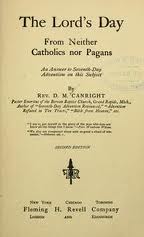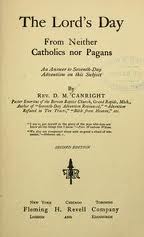The Lord's Day by D. M. Canright
A Review by Nathan Battey

The book begins with a brief description of Adventism and why the author left its ranks. One of the advantages of this book is that the author formerly espoused the doctrines which he herein refutes, and is able to give an insider’s view of how people are convinced of Adventism’s errors. While introducing Adventism, he gives a brief history of several prominent leaders who claimed to be prophets and were proven false when their predictions of future events failed. He discusses this history to establish the shoddy foundation of Adventism from the beginning. Again, this is a brief introduction and is not the main thrust of this book. If you want a more detailed introduction to Adventism check out Canright’s other book “Seventh Day Adventism Renounced.”
Next, he discusses the origin of the Roman Catholic Church and proves the observance of the First Day of the Week was in place long before the Catholic Church was planted in Rome. He goes to great lengths to establish the difference between “catholic” meaning “universal” and “Catholic” in relation to the Roman Church and Papacy. While doing this he quotes modern “Catholic” scholars who verify Sunday worship was the practice of New Testament Christians during the days of the apostles, and did not come about as a result of a Pope’s decree.
He then turns his attention to combating the notion that Sunday was a pagan holiday of worship to the sun that the Pope turned into a day of worship to (like was done with Christmas). He presents an overwhelming amount of evidence from early historical sources dating between A.D. 100 -200 to show Christians observed Sunday as the Lord’s Day prior to Constantine’s Sunday Law in A.D. 321. In doing this he also proves the Roman Church is not the “Mother” church, but was rather a planted church coming a long time after the day of Pentecost.
So, what was the true purpose of Constantine’s decree in A.D. 321? It was to found the civil observance of Sunday for the Roman Empire rather than a religious observance (the religious observance was already in place). Constantine’s decree was for pagans -not Christians- so that the pagans could respect the Christian’s day, (though they were not required to worship on Sunday). The name Sunday does not reflect a pagan holiday in worship to the sun (as Adventists teach), but was rather an astrological term used by the Pope so pagans could understand the designation of the day in their own terms. In truth, Constantine’s Law of A.D. 321 was an attempt to make the pagans conform to a Christian day rather than forcing Christians to observe a pagan day (as Adventists falsely teach).
Canright concludes the book by critiquing Adventist’s claims that the Papacy is the ten horned beast of Revelation 13:1-10, that Sunday Keeping is the mark of the beast, and that the Papacy has destroyed the Ten Commandments. Though he does not give an explanation of what Revelation 13:1-10 does mean, he clearly shows why the Adventist’s interpretation is false, how it is self contradictory, and how it has been modified time and again to cover it’s glaring flaws.
My General Opinion (3/5*****)
I found this book quite helpful in some areas and dated in others. Adventists have undoubtedly come up with fresh arguments since this book was written, but Canright’s discussion of the Lord’s Day, the historical proof of it being in existence before A.D. 321, and his discussion of Constantine’s edict are still helpful and relevant. He gives good documentation for the mountain of supporting evidence that he supplies (there may be more evidence than most readers want to wade through). All in all I found this work informative, helpful, interesting, and easy to understand though a little dry and overkill in some areas.
| Here is a free downloadable version of this book in pdf format:
| This work is rather rare in printed format. I have one hardback copy in good condition available for $15. If you would like to purchase this copy, fill out the order form which can be found by clicking on the tab below. | |||


 RSS Feed
RSS Feed
